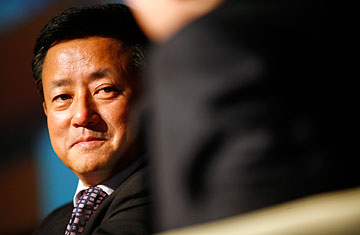
Fan Gang, director of China's National Economic Research Institute, speaks at the World Economic Forum (WEF) in Dalian, China, on Sept. 7
For most of 2008, Chinese financial élites would retail a dark joke making the rounds in Beijing and Shanghai: we sell Americans poisoned food, toys and pharmaceuticals — and they sell us poisoned financial products. Who's getting the worst end of the deal?
China's financial system, remember, is not a major victim of the implosion that is taking down markets and economies across the globe. Its banks, which have slowly rebuilt their balance sheets for the past decade, have been dinged but not crippled by exposure to the subprime mess. But Chinese government policymakers and financial CEOS are looking on in horror nonetheless, and asking themselves a fundamental question: what lessons should we learn from this debacle?
For China the question is critically important. The country's financial markets are a work in progress. They are more open than they were a decade ago, when the Asian crisis rocked global markets, but they are still nowhere near as sophisticated, nor as liquid, as Chinese policymakers would someday like them to be. The value of China's currency, the renminbi, is still basically controlled by the government. There are strict limits on how much Chinese citizens can legally invest abroad. There are trade barriers on what businesses foreign banks can go into inside China. And there are no derivatives markets. In an Oct. 21 speech in New York to a U.S.-Chinese business group, Treasury Secretary Henry Paulson all but pleaded with his counterparts in Beijing not to learn the wrong lessons from "the mistakes we have made," and to continue liberalizing their financial system.
To a surprising degree, China appears to still be listening. It's true that at a meeting in Beijing late last week of Asian and European leaders premier Wen Jiabao called for more global regulation of financial markets, but that's become conventional wisdom pretty much everywhere. "Few among Beijing policymakers are arguing to build more walls between China and the outside world when it comes to trade or financial markets," says one western diplomat who attended the ASEM meeting last week. Officials in Beijing are quick to point out that key policymakers at the Bank of China, the National Development and Reform Commission and the Ministry of Finance are all reform minded. Many hold advanced degrees in economics or business from the U.S. (though "these days they don't advertise that as much as they used to," one young Ministry of Finance source jokes.) They are a few years away from being the ultimate decision-makers, but they are the ones doing the policy analysis that Party officials rely on to make decisions.
Beijing certainly isn't backing off. Earlier this month, China announced it would proceed with a trial period allowing domestic financial institutions to experiment with short selling and margin trades (using borrowed money to invest). The decision came, ironically enough, after the U.S. Securities and Exchange commission had for a time banned short selling of a variety of financial stocks — a controversial move that critics believe was a simple case of finding a scapegoat in the midst of market chaos. "It was a little signal that Beijing has a plan — a slow, methodical plan to reform their markets — and they are sticking to it," says a U.S. Treasury official.
Well, mostly. There has been a rearguard action among conservatives — "market skeptics," is how one U.S. source describes them — to throw sand in the reform gears as the global carnage mounts. That, in part, explains Paulson's speech in New York. The conservatives have made some headway. Fan Gang, a liberal economist and adviser to the Ministry of Finance, says that any move towards derivatives trading on the Chinese exchanges is, at least for now, "probably on hold."
Despite the U.S. housing debacle — and the huge losses derivatives linked to bad mortgages have caused across the globe — introducing them to China was high on western banks' wish list. They argue that relatively straightforward derivatives deepen the liquidity of both debt and equity markets, and provide investors with useful hedging vehicles. "The Chinese understand all that," says Nicholas Lardy, an economist at the Peterson Institute for International Economics in Washington. "But the Chinese really want to study how this happened [in the U.S.], what derivative's role was, and how they can avoid it in the future. That's all going to take some time."
The more politically sensitive issue — on both sides of the Pacific — is whether China will continue to allow its currency to appreciate. The RMB is up almost 20% against the U.S. dollar since July of 2005, and that's part of the reason small, low-end Chinese exporters have seen their profits dwindle. A Chinese businessman asked Paulson after his speech whether the renminbi had appreciated sufficiently against the dollar. Paulson didn't answer directly, but in Beijing they know what the answer is: you bet it has. With Chinese growth slowing significantly and the economic pain spreading, "any further liberalization of the currency market is likely to be very gradual for the foreseeable future," Lardy says. "Beijing hasn’t jumped off the reform train" as a result of the crisis of 2008, says Lardy. "But the train has definitely slowed."
